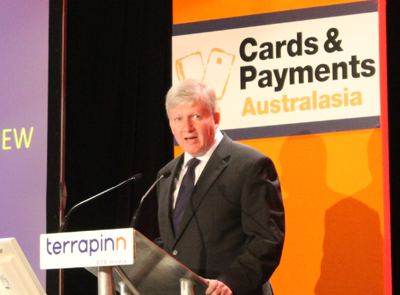Cheque, cash use in steady decline: RBA

According to Reserve Bank assistant governor (Financial System) Malcolm Edey, Australians are gradually changing all of their payment habits with the use of cheques, as cash payments fall each year.
He said that cash is falling out of favour, the use of cheques is virtually non-existent and debit cards are gaining but we haven't quite made the leap to paying by mobile phone yet.

Reserve Bank of Australia assistant governor (Financial System) Malcolm Edey(Credit: Luke Hopewell/ZDNet Australia)
"The number of cheques written in Australia has been declining by an average of 9 per cent per year over the past decade. Over time, this is adding to unit costs. The result is that cheques, which were already an expensive form of payment, are becoming increasingly so," Edey said at the Payments and Cards Australia conference in Sydney today.
The Reserve Bank of Australia is currently doing a strategic review of payments systems and is in consultation with industry, vendors and end-users, with a preliminary findings report due out mid-year, set to be followed by more consultations.
Edey said that an important part of the review was the study of 1200 households conducted in October and November 2010.
Edey said that since the previous study in 2007, the use of cash has declined, especially in its share of traditional payment methods, falling to about 30 per cent from 40 per cent.
He said debit cards seem to be taking over from cash with debit cards and the use of EFTPOS gaining.
The use of cheques is falling out of favour, with fewer than 40 per cent of the study's respondents saying they had made a payment by cheque in the past year.
Over a third of those said they paid by cheque because there was no other alternative and a quarter said they used a cheque so there would be a record of payment.
In contrast, over 80 per cent of those surveyed said they had made an online purchase and almost 60 per cent reported making an online transfer of funds. Another 60 per cent of the study's respondents said they paid most of their bills online.
Only 3 per cent of respondents said they had made a contactless payment in the last month.
Edey said that public transport was a great way to standardise contactless payments, resulting in wide adoption, and that Australia's disparate public transport systems are acting as a barrier.
"I think that is an area where a degree of standardisation and co-operation is needed, and that has been slow to develop here," he said. "I can't tell you who I'm blaming for that or anything like that, I just make the observation."